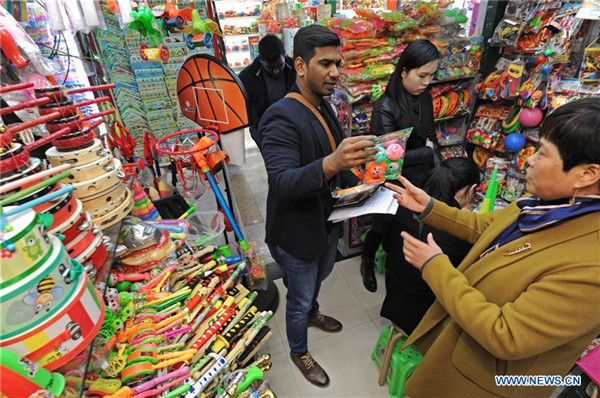From Guangzhou to Nairobi, making dreams a reality


A business owner (1st R) sells small commodities to an African dealer at Yiwu International Trade City in Yiwu, east China's Zhejiang Province, Jan. 5, 2017. (Xinhua/Tan Jin)
Walking on Baohanzhi Street in Guangzhou, capital city of south China's Guangdong Province, Felly Mwamba greeted a patrolling security guard in Chinese, spoke French as he introduced local businesses to a fellow countryman, and was randomly stopped by an acquaintance for a quick chat.
Mwamba, a businessman from the Democratic Republic of the Congo, is known as a "civil diplomat" of the Africans living in the Dengfeng community, where over 800 African residents live among more than 1200 registered foreigners.
But the flow of people is two way, and a growing number of Chinese are calling Africa home. Alongside rapidly developing bilateral ties, China-Africa people-to-people exchanges are booming.
HOMEGROWN NEIGHBORHOODS
Baohanzhi Street, where Mwamba lives, is nicknamed "African Street." After living in Guangzhou for 15 years, Mwamba has earned himself a reputation for building bridges between Chinese and Africans in the city and beyond.
Guangzhou is home to the densest population of Africans in the country and is China's main port for entry and exit. In 2017, roughly 320,000 Africans entered or left China through Guangzhou, according to local customs.
"I'm lucky to be here at the best time of China-Africa trade," Mwamba said in fluent Chinese. "I often tell my friends that no matter where my business extends to, China will always be my base."
Every day tons of made-in-China products, such as clothes, household appliances, mobile phones and motorcycles, are shipped to Africa. Meanwhile, African products such as crops, sea food and coffee are exported to China.
"The Xiaobei business district where Baohanzhi Street is located fully reflects the pragmatic, win-win and inclusive features of China-Africa economic and trade cooperation," said Liu Jisen, executive vice president of the Institute for African Studies at Guangdong University of Foreign Studies.
"Many African people regard Guangzhou, especially Xiaobei, as the starting point of their dreams," Liu said.
As similar African communities in other Chinese cities such as Yiwu in Zhejiang Province are likewise embracing opportunities, a growing number of Chinese neighborhoods are emerging in Africa.
For many Chinese living in Nairobi, a typical Saturday morning in the Kenya-China Supermarket is spent eating steamed rice rolls and chatting in a traditional tea house.
Chinese businesses are ubiquitous, including restaurants, a farmers' market, hair salon, hardware store, clinic and souvenir shop. Today, there are at least four Chinese "business districts" in the country.
When Song Ai, founder of Chinya Tea Development Co., LTD in Kenya, first arrived here, common Chinese snacks and premium tea from China were scarce. Not anymore. Song attributed the drastic change over the past decade to the closer relationship between China and Africa. "I think with the Belt and Road Initiative, more and more Chinese people like me will get the chance to pursue their dreams in Africa," she said.
MOST POPULAR
- 1 $39.7 billion worth of deals inked at Airshow China
- 2 China announces tax relief measures to stabilize real estate sector
- 3 A look at China's economy in October, 2024
- 4 Public holiday extension announced
- 5 China's NEV annual production hits 10 million milestone amid global carbon reduction efforts
Editors' Picks
 Infographic:
A look at China's economy in October, 2024
Infographic:
A look at China's economy in October, 2024
 Infographic:
G20 at a glance
Infographic:
G20 at a glance
 Video:
Peru sees new port open
Video:
Peru sees new port open
 Infographic:
China's public holidays for 2025
Infographic:
China's public holidays for 2025
 Infographic:
Basic facts of APEC
Infographic:
Basic facts of APEC


